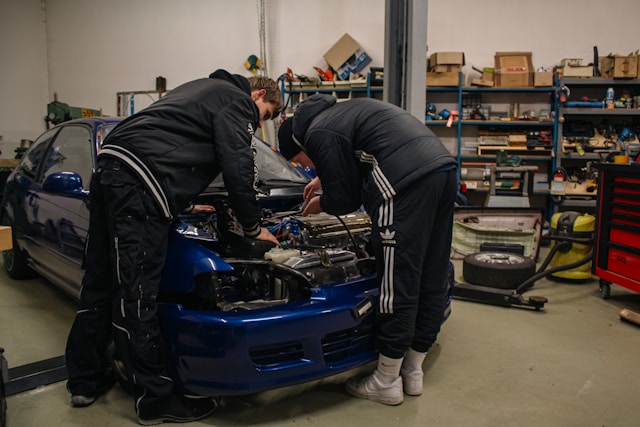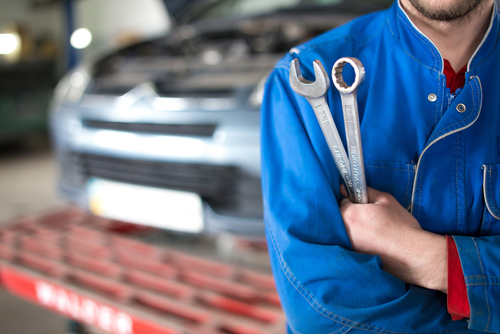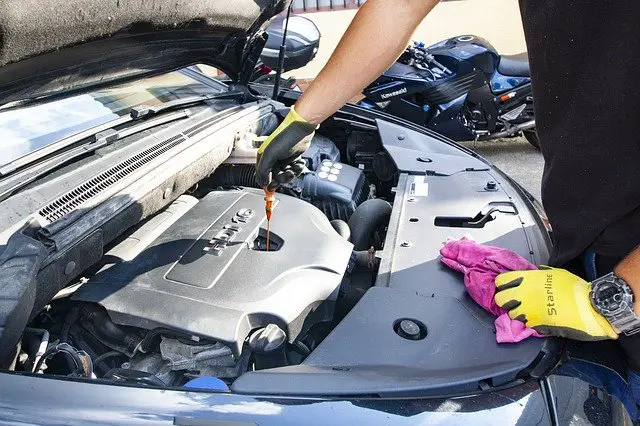Keeping our vehicles in peak condition relies heavily on the skills and experience of skilled mechanics. In the automotive repair industry, these professionals generally fall into two main categories: general mechanics and specialist mechanics. Each plays a crucial role in maintaining the safety, performance, and reliability of our vehicles.

General Mechanics
A car mechanic, also known as an auto mechanic or automotive service technician, is a skilled professional who diagnoses, repairs, and maintains automobiles, trucks, and other vehicles. They work on mechanical and electrical systems, including engines, brakes, transmissions, and electrical components. They are your go-to professionals for routine maintenance and common problems affecting most makes and models.
Their responsibilities include tasks such as:
Diagnosing and Repairing Common Issues
- Using diagnostic equipment to pinpoint simpler issues within a vehicle’s systems, including those that are computer-controlled, electronically, or electrically governed.
- Replacing or repairing damaged parts and components.
- Addressing mechanical problems related to the transmission, brakes, engine, and electrical components.
- Assessing the condition and safety of repairs to ensure quality and reliability.
Preventative/Routine Maintenance
- General mechanics often take care of regular service needs such as oil changes, fluid top-ups, tire rotations, and brake inspections, repair and replacements. They are also tasked with lubricating essential parts, wheel alignment, and replacing batteries as needed.
- Vehicle Inspections: Checking vehicle systems to ensure they are in good working condition.
- Basic engine diagnostics: Basic engine diagnostics involve using specialised tools and techniques to identify potential issues within a vehicle’s engine. This process is essential for detecting problems early, and before they lead to serious damage or affect performance. Common diagnostic procedures include scanning for Diagnostic Trouble Codes (DTCs) with an OBD-II scanner, performing visual inspections, and testing key components such as spark plugs and ignition coils.
- Examining Engine Components: Checking for signs of damage, leaks, loose connections, or worn components like spark plugs, ignition coils, and belts.
- Compression Testing: Measuring the pressure in each cylinder to assess engine performance and identify potential issues like worn piston rings or a leaking head gasket.
- Fuel Pressure Test: Checking the fuel pump and fuel injectors to ensure they deliver the correct amount of fuel.
- Ignition System Test: Evaluating the performance of spark plugs, ignition coils, and related components to identify misfires or weak ignition.
- Compression Testing: Measuring the engine’s ability to hold pressure, indicating potential mechanical issues.
- Fuel Pressure Gauge: Checking fuel pressure to ensure the fuel pump and injectors are functioning correctly.
- Other Tests: Testing may also include checks for vacuum leaks, engine noise, and the health of the air conditioning system.
Suspension and Steering Repairs: Suspension and steering specialists focus on diagnosing, repairing, and maintaining a vehicle’s suspension and steering systems. They work on critical components such as shock absorbers, struts, ball joints, tie rods, and power steering systems to ensure the vehicle handles smoothly and safely on the road.
These services are essential for keeping vehicles running efficiently and preventing more significant problems down the line. General mechanics typically operate in independent workshops, chain service centres, or dealerships. Their versatility is a significant asset, as they are skilled in diagnosing and repairing a wide variety of vehicle brands and models. This adaptability makes them a convenient option for many car owners.
Specialist Mechanics: Masters of Their Craft
While general mechanics have a wide-ranging skill set, specialist mechanics focus on specific areas of automotive vehicle systems. This focused expertise is especially important when dealing with complex issues that require deeper knowledge and hands-on experience.
A specialist mechanic, also known as a mechanical specialist, concentrates on maintaining, repairing, and troubleshooting specific types of mechanical equipment or systems. Their extensive knowledge and skills in particular machinery or processes enable them to diagnose and resolve issues more effectively than general mechanics.
Here’s a closer look at what they bring to the table:
- Specialised Knowledge: Specialist mechanics possess in-depth expertise in specific areas such as diesel engines, auto-electrics, or high-performance vehicles.
- Diagnostic Skills: Utilise their specialised knowledge to accurately identify the root causes of mechanical problems, often employing advanced tools and equipment.
- Repair and Maintenance: These professionals handle repairs, maintenance, and upgrades for the equipment or systems within their area of specialisation.
- Troubleshooting: They are adept at troubleshooting complex mechanical issues and determining the most effective solutions.
- Preventative Maintenance: Many specialists implement and adhere to preventative maintenance schedules to reduce downtime and prolong equipment lifespan.
- Safety: Specialist mechanics are responsible for ensuring safe equipment operation and compliance with safety protocols.
Examples of Specialist Mechanic Roles - Diesel Mechanic: Focuses on diagnosing and repairing diesel engines, commonly found in trucks and heavy machinery, addressing unique challenges specific to these engines.
- Performance Mechanic: Works with high-performance vehicles, including those used in racing, requiring advanced knowledge of engine tuning and modifications.
- Auto-Electrician: Specialises in electrical systems in vehicles, which include ignition, charging, and wiring systems.
- Machine Specialist (Industrial): Maintains and repairs specialised machinery in factories or industrial settings.
- Plant Mechanic: Works with large machinery and equipment in construction or industrial environments. This specialised expertise makes them invaluable in their respective fields, ensuring optimal performance and safety of the machinery they work with.
- Transmission Specialists: Focus on the repair and rebuilding of transmission systems, ensuring smooth operation and performance.
- Electrical System Specialists: Address issues related to wiring, lighting, sensors, and onboard computer systems, ensuring the electrical components of vehicles function correctly.
- Air Conditioning Specialists: Repair and maintain automotive climate control systems, ensuring passengers remain comfortable in differing weather conditions. Car air conditioning (A/C) specialists are generally distinct from general air conditioning specialists, though there can be overlap. Car A/C specialists focus on the unique challenges and components of vehicle A/C systems, while general A/C specialists work with residential or commercial systems. Car A/C specialists understand the specific design of car A/C systems, including the location of components, refrigerant types, and how the system interacts with the vehicle’s other systems.
- Manufacturer-Specific Technicians: These technicians receive specialised training from specific automotive brands (such as BMW, Renault, Toyota, Hyundai, Mercedes, to name a few) to understand the unique features and requirements of those vehicles, providing expert care tailored to each make.
Key Responsibilities include:
- Specialised Repairs: Specialist mechanics concentrate on particular systems such as engine performance, transmissions, brakes, or advanced electrical components. When a vehicle has a problem that is more complicated than usual, it is often referred to a specialist for detailed diagnosis and expert repair.
- Working with Advanced Technology: Today’s vehicles are more high-tech than ever, and constantly evolving, equipped with sophisticated computer systems and smart technologies. Specialist mechanics receive extensive training to keep up with these advancements, giving them the tools to handle repairs that general mechanics might not be equipped, skilled, experienced, or trained to manage.
- Certifications and Ongoing Training: Specialist mechanics often pursue additional certifications in their chosen fields. These qualifications prove their commitment and obligation to staying updated with the latest tools, techniques, and industry standards.
- Teamwork in the Workshop: In many automotive service centres, general and specialist mechanics work together as a team. If a general mechanic encounters a particularly complex issue, they’ll often consult a specialist to make sure the problem is fixed correctly and efficiently. This collaboration ensures the best possible care for the vehicle.
The Importance of Both Roles
General and specialist mechanics each play their specific and vital parts in keeping vehicles safe, reliable, and road ready.
General mechanics handle routine maintenance and everyday repairs – those tasks that form the foundation of vehicle care and help prevent minor issues from becoming major problems.
Specialist mechanics, on the other hand, step in when more complex issues arise. Their advanced knowledge allows them to tackle intricate repairs that require precision and in-depth understanding of specific vehicle systems.
Together, these professionals ensure that vehicles not only perform at their best but also remain safe for drivers, passengers, and pedestrians. Regular maintenance and accurate diagnostics help prevent breakdowns, reduce repair costs over time, and most importantly, contribute to safer roads. It is the combined expertise of both general and specialist mechanics that keeps the automotive world running smoothly.
Final Thoughts
Selecting the right mechanic is crucial for the care your vehicle receives and the safety of everyone in the vehicle and those on the road. Whether you require routine maintenance, are dealing with a common repair, or need specialised diagnostics, knowing the differences between general and specialist mechanics helps you make informed choices. Mechanics play a fundamental role in ensuring that vehicles remain safe, reliable, and efficient. Through their maintenance, repairs, skills, experience, and diagnostic expertise, they keep vehicles running smoothly, prevent minor issues from escalating into major problems, and minimise the risk of costly breakdowns, all of which contribute to road safety and reliability. Both general and specialist mechanics are essential in maintaining vehicles’ safety, functionality, and roadworthiness.
Ultimately, your choice should depend on the nature of the issue and your vehicle’s specific needs. In many cases, starting with a general mechanic is a sensible first step, as they can accurately diagnose the problem and refer you to a specialist if needed. In the realm of automotive repair, having the right knowledge is invaluable. Understanding whom to approach – and when – can significantly extend the lifespan of your vehicle and provide you with peace of mind.

